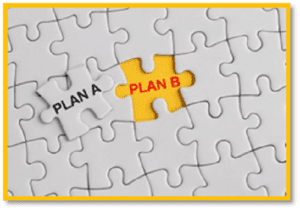Plan B Professions: Navigating Your Backup Career
 “Please don’t suggest backup, because my child will lose focus”, “Considering backup; the first career effort may be reduced”. We hear similar statements from parents in many career counseling sessions.
“Please don’t suggest backup, because my child will lose focus”, “Considering backup; the first career effort may be reduced”. We hear similar statements from parents in many career counseling sessions.
This is their approach, but as counselors, we also have to suggest other appropriate and available options to students. Another point of view is – competition, limited seats in reputed colleges, good scores, subjects studied, etc.
No one can guarantee admission to a college, given the increasing number of students. The past few years have seen many instances where the student did not consider any other option and could not even get admission in the course of their choice. The reasons can be anything.
Disadvantages, unwillingness to attend a given college, location or financial problems, etc. But the result is that with no other option considered, the year may be lost or one is forced to choose from the rest of the available options. For these reasons alone, having a backup can be beneficial.
Here are some tips for a Backup Career:·
- You can feel more secure and in control of your choices if you have a backup.·
- Backup can give you more opportunities to explore new career paths or take risks without fearing failure in your primary career.·
- Career–related can help you make the right decision by considering the pros and cons more effectively.·
- Backups can help you improve your skills and broaden your career path. You can get more options and opportunities for growth and success·
- Having a backup plan ensures you have alternatives if needed.·
- A backup plan enables you to switch to another option more easily if your primary career path has challenges or is less viable.
Overall, having a career backup helps you feel more prepared and confident. Making a backup plan in time allows you to build a thoughtful, informed, and passionate career without making decisions based on your emotions.
It’s important to note that having a backup plan can be beneficial, but it’s just as important to focus on your primary career goals and put effort into their pursuit. A backup plan should complement your primary career path rather than distract you.
Frequently Asked Questions (FAQs) for Backup Career:
1. What is a backup career, and why is it important?
A backup career is an alternative career plan or profession that individuals develop alongside their primary career. It’s important as it provides a safety net in case of unexpected job loss, career changes, or shifts in personal circumstances.
2. When should I consider pursuing a backup career?
It’s a good idea to consider a backup career when you have the time, resources, and interest to explore another field. It’s not solely for emergencies but can also enhance your skill set and career options.
3. How do I choose the right backup career?
Select a backup career that aligns with your skills, interests, and market demand. Assess your strengths and weaknesses, research the field, and consider whether it offers stability and opportunities.
4. Should I invest time and money in training for my backup career in advance?
Investing in training or acquiring skills for your backup career in advance can be beneficial, especially if it requires specific qualifications or certifications. However, it depends on your personal circumstances and goals.
5. How can I balance my primary career with preparing for a backup career?
Balancing both careers may involve time management, setting clear priorities, and making gradual progress in building skills and connections for your backup career.
6. What are some examples of popular backup careers?
Backup careers can vary widely and depend on individual preferences and skills. Common examples include freelancing, entrepreneurship, teaching, consulting, and creative pursuits like writing or art.
7. Can a backup career become a primary career over time?
Yes, a backup career can transition into a primary career if circumstances change, and you decide to make it your focus. Many people successfully pivot from their backup career to their primary career.
8. How can I maintain enthusiasm for my backup career while focusing on my primary one?
To stay motivated, periodically revisit your goals for your backup career, engage in skill-building activities, and seek opportunities to apply your backup career skills when possible.
9. Is it okay to discuss my backup career with my current employer?
Whether to discuss your backup career with your current employer depends on company policies and your relationship with your supervisor. Some employers may be supportive of employees pursuing side ventures, while others may have restrictions.
10. What role does networking play in building a backup career?
Networking can be crucial for building connections and opportunities in your backup career. Attend industry events, join relevant groups, and engage with professionals in the field to expand your network and stay informed about potential opportunities.






